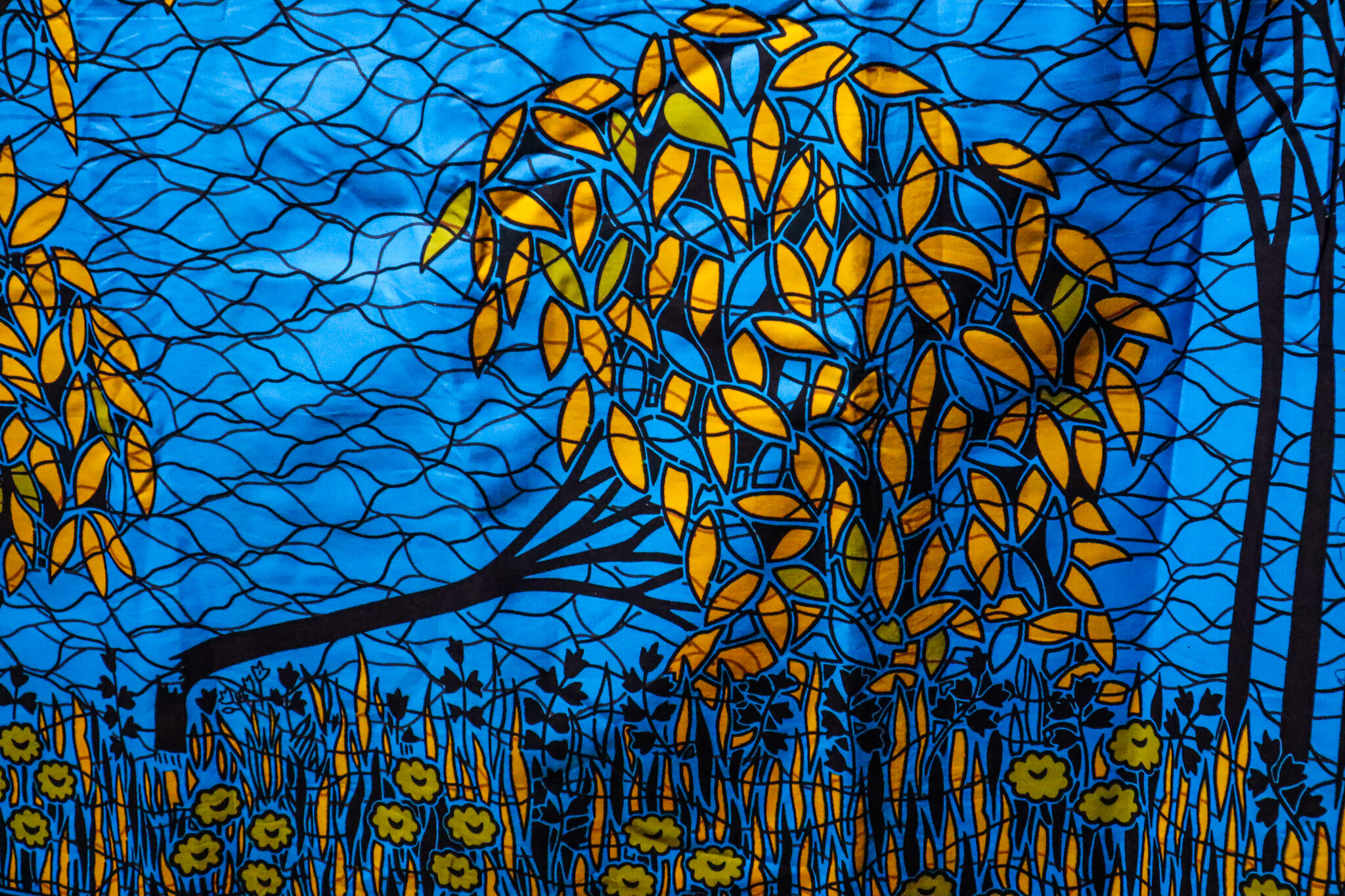In conversation with Ama Sarpong and Eunice Boateng
“Fabric prices often change based on the movement of the dollar.”
- Ama Sarpong
(L-R):Ama Sarpong and Eunice Boateng, Image: MTotoe/FLO London
Mother and daughter duo, Eunice and Ama, own a wholesale and retail fabric store in Kaneshie Market. They have been selling a selection of classic wax print fabrics for the past 15 years. The ladies spoke with us about how they started the store, about the different fabrics they sell and the meanings behind some of the much-loved fabrics worn by Ghanaians.
Kaneshie Market was built in the 1970s and is one of Accra’s premier markets selling everything from textiles, household items to food.
Hi Ama and Eunice! Can you tell us about your journey to owning your own fabric store?
Eunice: Initially I was just selling Kente to people. Eventually, I built up a client list and my clients were looking for cloths as well as Kente so I began looking for a more permanent location to be able to sell a variety of cloths to accommodate my customers.
Kaneshie Market was the closest to where I live, so this is where I opened my store.
What types of fabrics do you sell?
Eunice: We have a variety of fabrics to cater to different budgets and occasions.
Ama: We sell Ghana Textile Project (often referred to as GTP). GTP fabrics are produced in Ghana. We sell five different types of GTP fabrics:
GTO Fabrics, Image: MTotoe/FLO London
Adepa – this is usually the fabric of choice for traditional weddings. The older generation prefers to wear this type of fabric.
Adepa Dumas – this is often used by office workers as work attire and is often preferred by the younger generation.
New Style – these are new styles, which is why we refer to it as new style cloth. It is often used for a variety of occasions and also preferred by the younger generations.
Nsroma – this type of fabric is black and white only and it is what we in Ghana use for funerals.
Safoa – this is blue and white and is often used for naming ceremonies
We also sell Akosombo Textile Limited fabrics (often referred to as ATL). These fabrics come in different varieties and are produced in Akosombo, Ghana. We also sell Printex which is also produced in Ghana. They are black and white fabrics that are usually used for funerals.
We stock some foreign-made fabrics such as Buta wax, Ordin and Hitarget, which are made in China. Some of our Hitarget fabrics are also made in Nigeria. We have fabrics produced in Holland, such as Prestige and Visco.
What is the market like for buying and selling fabrics?
Eunice: Hitarget fabrics are often used to make dresses and shorts because it is a softer material and is easier to sew with. Fabrics like GTP are much coarser so are more difficult to sew.
Ama: Hitarget material is usually cheaper then GTP. Fabrics such as GTP are often the preferred material people use to gift to people for things such as traditional engagements and other occasions.
There are much cheaper fabrics. The cheapest fabric you can get is Kuffour fabric. The fabric was named after the former president. It was during his presidency that this fabric began being exported to Ghana so this is why we call the fabric Kuffour. You can probably get 6 yards of this fabric for about 30GHS (roughly £4).
Fabric prices often change based on the movement of the dollar, and of the fabrics, Hitarget is usually the one that is changing frequently. Fabrics such as Visco are more expensive than the other fabrics and are often used by our wealthier customers. They also produce fabrics that incorporate gold stripes.
What can you tell us about the Ahwenepa Nkasa fabric?
Eunice: The Ahwenepa Nkasa fabric has a very important meaning.
It means: women who are great will not have to talk plenty for you to know. It is similar to the saying that empty barrels make the most noise…
When did you first start selling Ahwenepa Nkasa?
Eunice: For as long as I can remember. This fabric has been around since Kwame Nkrumah’s time.
Can you tell us about the proverbs behind some of the other fabrics you sell?
Ama: Yes… so, Ama Serwaah – this was named after a beautiful woman.
Nsu bra – Nsu bra means ‘water well’ in Twi, a language widely spoken in Ghana. The pattern on the fabric resembles the ripple effect of water when a stone is thrown into it. A reminder amongst Ghanaians that your actions can impact others.
Nsu bra fabric
Dua koro agye erama a ebu fabric
Adu Krom – lover’s water.
Dua koro agye erama a ebu – it means if one tree stands alone the wind can blow it down, however, if many trees stand together it’s not so easy to blow them down. You can see on the fabric one tree fallen and a group of many trees standing together. It is a testament to unity.
What do you love about Ghana?
Ama: The food! In Ghana our food is good. The people also. Here in Ghana, we are relaxed and the people are nice.
Eunice: Yes we are very relaxed and friendly people.
Click here for more interviews from our Ghana Culture Series.
Image: MTotoe/FLO Lomdom








